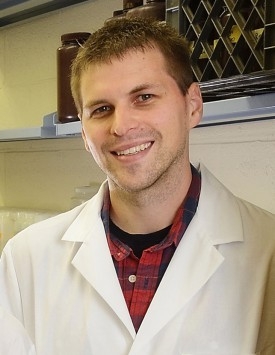Dr. Jonathan Doubek
PHD FELLOW GRADUATE | Global Change Center
VT Graduate May 2018, Biological Sciences
Advisor: Dr. Cayelan Carey
Google Scholar • Website • jdoubek@lssu.edu

Jon completed his Ph.D. studies in May of 2018, and has since worked as a Postdoctoral Associate in the Rubenstein School of Environment and Natural Resources at the University of Vermont. In Fall 2020, Dr. Doubek began a position as Assistant Professor of Freshwater Ecology at Lake Superior State University.
Jon joined the Carey Lab in Fall 2013, as a Ph.D. candidate studying freshwater biology. His primary research focus is quantifying how multiple stressors (e.g. land use changes, climate change, invasive species and nutrient loading) affect lake planktonic communities, which have resulting consequences for lake water quality and human use. He combines field research, laboratory experiments, and ecosystem modeling to examine how each of these aspects individually influences lake food webs, but also how these different stressors can interact for combined effects.
Jon developed an early appreciation for freshwater science while growing up in the Upper Peninsula of Michigan. He earned his B.S. and M.S. from the University of Michigan -Ann Arbor in the fields of Ecology, Evolution and Conservation Biology. His M.S. thesis utilized isotope spectrometry in examining zooplankton food web relations in the Laurentian Great Lakes. In addition, he explored how land use changes and nutrient loading affect lake cyanobacterial dominance and how phytoplankton biovolume and composition can influence ecosystem services.
During his education at the University of Michigan, Jon worked with the City of Ann Arbor for a few summers. He collected and analyzed weekly water samples in the lab and provided the City with a final report to help inform management decisions. He aided the Huron River Watershed Council (HRWC) by directing and educating volunteers in water quality monitoring and environmental stewardship, and by providing feedback and updates to Michigan governmental agencies on the water quality status of the Huron River. Jon also collaborated with research scientists from the United States Geological Survey on historical zooplankton food webs in the Great Lakes region.
Jon values an interdisciplinary approach to scientific research and believes the Interfaces of Global Change program has enhanced his ability to work professionally with individuals across a variety of academic fields. According to Jon, “addressing the current lineup of environmental threats will require communication, collaboration, and cooperation across diverse disciplines. The IGC graduate education program has been invaluable to me in providing a comprehensive toolset for dealing with these complex, interdisciplinary issues.”
Jon also graduated as a Global Lake Ecological Observatory Network (GLEON) Fellow. The GLEON Fellowship Program trains small cohorts of graduate students from around the world to analyze large and diverse data sets, operate effectively in diverse international teams, and communicate science to researchers, the public, and managers. As a GLEON Fellow, Jon participated in three international workshops over 1.5 years while completing an interdisciplinary, collaborative scientific project.


